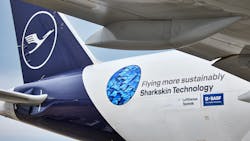Lufthansa to equip entire Boeing 777F fleet with sharkskin technology
COLOGNE, Germany - Lufthansa and its cargo division are both seeking to make flying as environmentally friendly and sustainable as possible. The German flag carrier is now looking to nature to help achieve this goal, with the rollout of sharkskin technology targetted for the airline’s Boeing 777F fleet beginning next year, Tom Boon reports for Simple Flying. Continue reading original article.
The Intelligent Aerospace take:
May 4, 2021 -The lower the frictional resistance of an aircraft in the air, the lower the fuel consumption. Using nature as a role model, the aviation industry has been intensively researching ways to reduce aerodynamic drag for many years. Now Lufthansa Technik and BASF have succeeded in making the breakthrough as part of a joint project. AeroSHARK, a surface film that mimics the fine structure of a shark's skin, is to be rolled out on Lufthansa Cargo's entire freighter fleet from the beginning of 2022, making the aircraft more economical and reducing emissions.
The surface structure consisting of riblets measuring around 50 micrometers imitates the properties of sharkskin and therefore optimizes the aerodynamics on flow-related parts of the aircraft. This means that less fuel is needed overall. For Lufthansa Cargo's Boeing 777F freighters, Lufthansa Technik estimates a drag reduction of more than one percent. For the entire fleet of ten aircraft, this translates to annual savings of around 3,700 tons of kerosene and just under 11,700 tons of CO2 emissions, which is the equivalent of 48 individual freight flights from Frankfurt to Shanghai.
"Responsibility for the environment and society is a key strategic topic for us," says Christina Foerster, Member of the Executive Board of Deutsche Lufthansa AG with responsibility for sustainability. "We have always played a leading role in introducing environmentally friendly technologies. The new sharkskin technology for aircraft shows what strong and highly innovative partners can achieve collectively for the environment. This will help us to achieve our goal of climate neutrality by 2050."
"The aviation industry is facing similar challenges to the chemical industry: ongoing progress must be made with climate protection despite high energy requirements. By collaborating closely and successfully combining our know-how in surface design and aerodynamics, we have now succeeded in taking a major step forward. This is an excellent example of sustainability in practice, achieved through partnership-based collaboration and innovative technologies," says Dr. Markus Kamieth, Member of the Board of Executive Directors of BASF.
Related: Airbus quantum computing challenge helps advance sustainable flight
Related: Study highlights sustainable role for VTOL aircraft
Related: Shell, Neste sign sustainable aviation fuel supply agreement
Jamie Whitney, Associate Editor
Intelligent Aerospace
